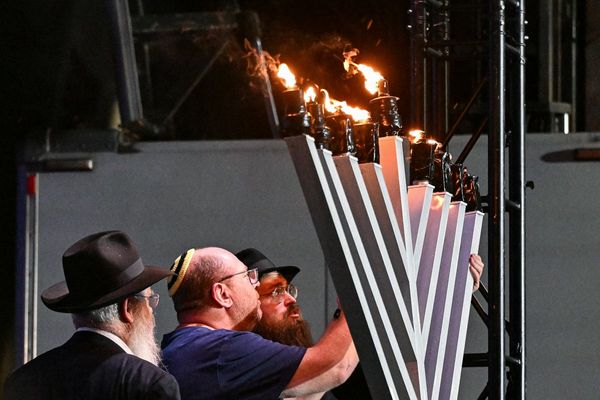
A little-discussed dilemma of the LGBTQ experience is foreign travel. For many opposite-sex couples, exploring the world together is one of their great bonding experiences, teeming with adventure and generating a lifetime of soppy memories. For LGBTQ couples, this experience is rather more fraught. There are, after all, 69 countries where homosexuality is prohibited altogether, 11 of which can enforce the death penalty for same-sex attraction.
In many other countries – take your pick: Indonesia, Russia, Madagascar – being gay may be legal, but that doesn’t preclude widespread discrimination and stigma. Booking a shared hotel room for you and your partner, or worries about public behaviour outing you as a romantic item, may deter you from most countries’ borders. As for traveling solo to somewhere like Egypt – now hosting COP27 – you’d do so likely knowing that authorities there have used dating apps to entrap and persecute LGBTQ people.
Qatar is one of those 69 countries where same-sex relations are forbidden. And yet this did not deter Fifa from awarding the Middle Eastern monarchy this year’s men’s World Cup back in 2010. Despite the regime’s claims that LGBTQ fans are welcome, some hotels will refuse to accommodate LGBTQ couples, and the country’s ruling emir made it clear that officials “expect and want people to respect our culture”. This monarch has found an ally in the British government, as the foreign secretary, James Cleverly, demanded that LGBTQ fans be “respectful of the host nation”. Whether this meant avoiding public displays of affection, or excessively flamboyant twerking to Kylie in a tight white vest, was unclear.
That Qatar was granted this honour with no consideration for the rights of LGBTQ people speaks for itself. It’s not as if it’s a great footballing nation – it clearly isn’t – and its successful bid was mired in accusations of corruption. Despite its protestations, in a choice between LGBTQ rights and profit, Fifa is clearly more committed to the latter.
Regimes that brutalise their own people are enthusiastic about hosting great sporting events in large part because they believe it will shore up their reputations. If this was Qatar’s intention, it has failed: rarely has the run-up to a World Cup been so sapped of enthusiasm, and there has been unprecedented attention on the monarchy’s human rights abuses. This week, a traumatising story about a gay man who claims he was entrapped on an app and subsequently raped by Qatar police officers was widely reported. Perhaps it would be educational for David Beckham – reportedly to be paid £10m over the next decade to be an ambassador to Qatar so he can tell the world how “warm and welcoming” it is – to meet this victim.
But while the potential unease suffered by LGBTQ western tourists is important, the fact that thousands of migrant workers – some of whom will be LGBTQ, statistically speaking – have died in Qatar since it was awarded the World Cup deserves far more attention and fury. And while any attention being drawn to the plight of LGBTQ people in Qatar is welcome, should it really require a one-off global sports tournament for this to be the case? Qatar has been repressive while being a western ally for years. And nearby Saudi Arabia beheads people for being gay – as well as brutalising women, murdering dissidents, and slaughtering children in Yemen. Yet Britain and other western states back it to the hilt with arms and diplomatic support. Is the hosting of a sports tournament really the prerequisite for outrage?
Perhaps more controversial, too, is how the global north uses “pinkwashing” – that is, trumpeting their own records on LGBTQ rights in contrast to other countries – to establish an ill-deserved moral superiority. The most striking example, of course, is Israel: the existence of LGBTQ rights is used to portray the state as a beacon of human rights, helping to deflect attention from, or even justify, its brutal occupation of the Palestinian people, the victims of which are straight and queer alike. And the fact that many states have poor records on LGBTQ rights because of the legacy of the British empire in particular – many African states enforce colonial-era laws – is airbrushed from the discussion altogether.
Focusing solely on the presence or absence of LGBTQ rights can deflect our attention from the wider picture. Given that the United States is jointly hosting the men’s World Cup in 2026, what if we expressed our outrage at the country’s use of mass incarceration, which leaves Black Americans nearly five times as likely to be behind bars as their white counterparts? Western states are also more likely to export their human rights abuses abroad, but does that make them less deserving of condemnation? When fans across the globe cheer on their teams in Boston’s Gillette Stadium or Seattle’s Lumen Field in four years’ time, what if we remembered the hundreds of thousands slaughtered in the Iraq war, or the mass human rights abuses committed in the failed two-decade occupation of Afghanistan?
It seems far easier to express revulsion at the brutal injustices committed in foreign lands than our own homes. This itself is part of the rationale of western hegemony. If we see our own nations as paragons of decency, and the rest of the world as brutal backwaters, we are less likely to scrutinise how western power affects the world.
So yes, we should be clear: Fifa’s actions appear to show it doesn’t care about LGBTQ people and their rights – or at the very least, that it considers them secondary to other cynical calculations. But this is no different from the west at large, whose authorities were only forced to grant queer people their rights because of struggle and sacrifice from below, and which happily ally themselves to murderous anti-LGBTQ regimes abroad. Qatar’s hosting of the World Cup 2022 deserves the derision it is receiving – but not at the expense of banishing consistency into exile.
Owen Jones is a Guardian columnist
Do you have an opinion on the issues raised in this article? If you would like to submit a response of up to 300 words by email to be considered for publication in our letters section, please click here.







